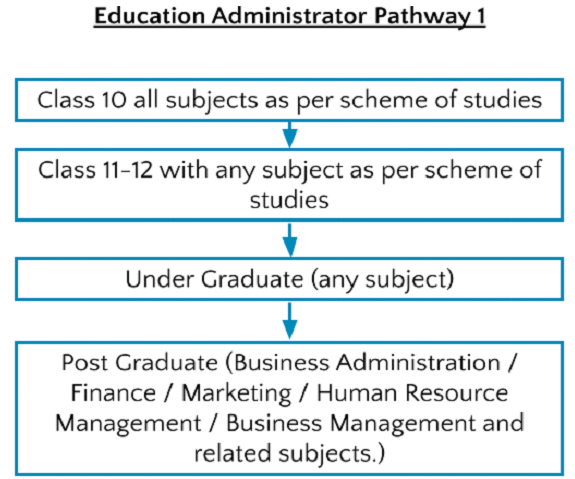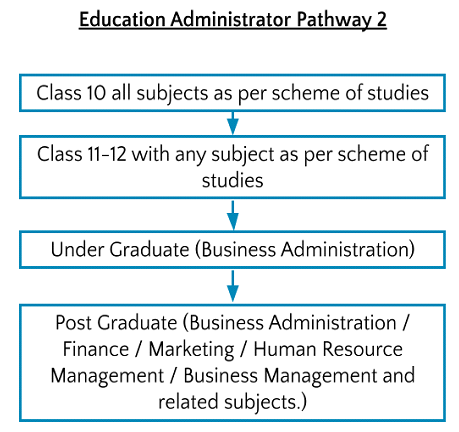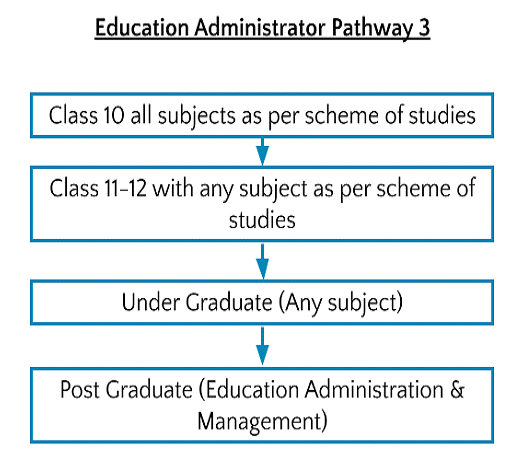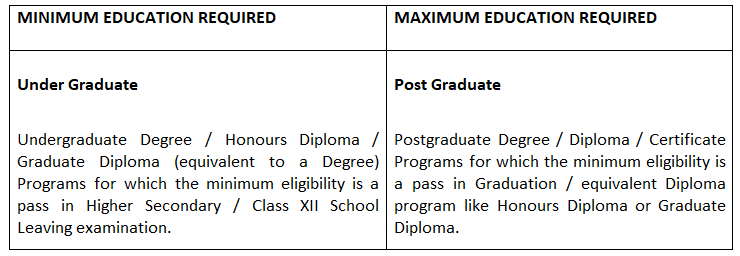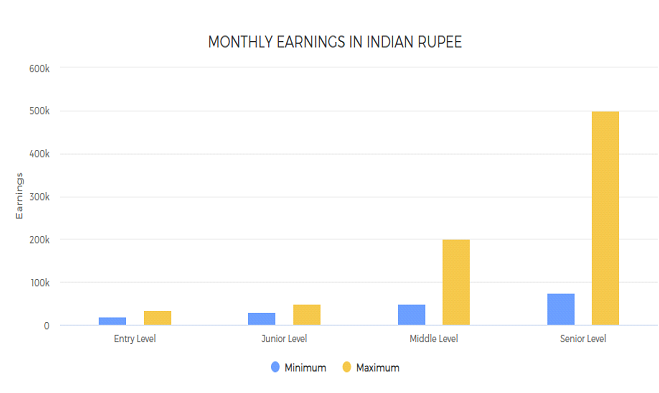Education Administrator
Entry Level Qualification
10
Career Fields
Education & Teaching
For Specially Abled







 ,
,
Career Entrance Exam
About Career
PARTICULARS | DESCRIPTION |
Name | Education Administrator |
Purpose | Achieving Specific Educational Objectives |
Career Field | Education & Teaching |
Required Entrance Exam | BHU UET, BHU PET, CUET UG, CUET PG, IPU CET UG, IPU CET PG |
Average Salary | 300000 - 400000 Rs. Per Year |
Companies For You | NMIMS, IMT, Xavier’s & Many More |
Who is Eligible | Class 10th Pass |
Education Administrator is a specialist who works in the education bodies like college, schools, institutes, universities, etc. and is responsible for the general administration and other non-academic functions of the college or university. Education Administration is a separate unit of the college from the academic or teaching unit and has no role in the teaching. Educational Administrators have some or the other kind of role in each and every educational institute although few schools or colleges may give the duties of an Education Administrator to their teaching staff also.
Education Administrators’ work profile depends on the size and type of the institute in which they work. If you are an Educational Administrator working in a small school, you might be working in multiple roles and duties, and the staff size is smaller in such institutes. However, if you are working in a large institute or school or college, then you will have a specific role in the organisation with several Education Administrators working together to manage the institute.
As an Education Administrator, some of you would be working in the marketing department of the institute. Some of you will be handling the sports and other extra-curricular activities of students. Some of you may be involved in student life and co-curricular activities. Some of you will be working as a general administrator. Some of you will be working in transport and other services (determining routes of school buses, stationary, dresses, canteen etc. Some of you will be working in the admission department and managing admissions. Some of you might be working at the front office and managing queries, phone calls, etc.
Key roles and responsibilities
As an Education Administrator, you will have several specializations. However, each of these specializations will have a few of all of these roles and responsibilities:
In the General department:
1. You will be responsible for the supervision of all hiring affairs including and not restricted to hiring people (teaching and non-teaching), promotion, tenure, appraisal (along with department heads).
2. You will be responsible for maintaining all official records.
3. You will be responsible for maintaining and auditing financial records.
4. You will be responsible for maintaining all campus buildings. You will also be responsible for construction, repair etc.
5. You will be maintaining the safety and security of the campus, people on campus, students, teachers, etc.
6. You will supervise and lead the information technology department of the campus. This will include maintaining hardware, software, local network, etc.
7. You will maintain public affairs by maintaining relations with local media, administration, community, etc.
8. You will provide student services like disability services, library services, etc.
Admissions Department:
1. You will determine how many students will be hired per year in each class, section or course in schools, colleges and universities.
2. You will organize events where prospective students can visit the institute. You will meet them and share information about the institute or school.
3. You will sell brochures, maintain records of people applying, review applications, etc.
4. You will manage all data of students who applied
5. You will arrange career counsellors in school/ institute to help students select courses.
6. You will schedule the yearly time table along with the teaching staff.
7. You will ensure students attend school regularly.
8. You will manage the school transport facilities.
Co-curricular and Extra-curricular activities department:
1. You will be responsible for all co-curricular activities, and school/ college/ institution functions like an annual day, celebrations, teacher’s day, Sports day, etc.
2. You will schedule programmes and activities like sports day, recreational activities, picnics, etc.
3. You will supervise children students’ activities, approve them and also provide financial assistance. These activities could be the annual day, parties, club and committees’ events, etc.
Career Entry Pathway
Class 10 all subjects as per scheme of studies – Class 11-12 with any subject as per scheme of studies – UG in any stream – PG in Business Administration / Finance / Marketing / Human Resource Management / Business Management / and related subjects.
After Class 11-12 with any subject as per scheme of studies, you can study any stream in your higher secondary school and then study for an undergraduate degree in any stream followed by a master’s degree in Business Administration / Finance / Marketing / Human Resource Management / Business Management and related subjects.
Class 10 all subjects as per scheme of studies – Class 11-12 with any subject as per scheme of studies – UG in Business Administration and related subjects – PG in Business Administration / Finance / Marketing / Human Resource Management / Business Management / and related subjects.
After Class 11-12 with any subject as per scheme of studies, you can study any stream in your higher secondary school and then study for an undergraduate degree in Business Administration followed by a master’s degree in Business Administration / Finance / Marketing / Human Resource Management / Business Management/ and related subjects. Although anyone can complete a Master’s Degree in Business Administration, having same at UG level helps.
Class 10 all subjects as per scheme of studies – Class 11-12 with any subject as per scheme of studies – UG in any subject – PG Degree/ Diploma and Education Administration and Management
After Class 11-12 with any subject as per scheme of studies, study for an undergraduate degree in any subject followed by a Post Graduate or PG Diploma in Education Administration & Management.
Required Qualification & Competencies
Undergraduate studies after school
1. To become an Education Administrator, you can take multiple pathways. You can study Business Management Business Administration in under graduation as B.B.A. or B.B.M.
2. Alternatively, can also study Science, Commerce and Arts with any subjects in under graduation.
Post Graduate studies
1. After graduation, you can study Business Administration (M.B.A.) in General Management, Marketing, Finance or Human Resources Management.
2. Alternatively, you can also study 1 year or 2 years Post Graduate Programs Post Graduate Diploma in Education Management.
COMPETENCIES REQUIRED
You should have the following occupational interests:
Enterprising: You should have interests for Enterprising Occupations. Enterprising occupations involve taking initiatives, initiating actions, and planning to achieve goals, often business goals. These involve gathering resources and leading people to get things done. These require decision making, risk-taking and action orientation.
Conventional: You should have interests for Conventional Occupations. Conventional occupations involve repetitive and routine tasks as well as fixed processes or procedures for getting things done. These occupations involve working more with data, systems, and procedures and less with ideas or creativity.
Social: You should have interests for Social Occupations. Social occupations involve helping or assisting others; these involve working with and communicating with people to provide various services; these may involve educating and advising others.
Following personality attributes are required:
1. You can always act independently or could do so in most situations.
2. You always prefer to experience new things and have new experiences, or you mostly do.
3. You are always practical or in most situations.
4. You are always or mostly disciplined in your action and behaviour.
5. You are always or mostly a soft-hearted person.
You should have the following skills and knowledge:
1. Active Listening: Giving full attention to what other people are saying, understanding the points being made by others, asking questions, etc.
2. Instruction: Skills in training others how to do something.
3. Supervising: Skills in Supervising and monitoring the performance of others, businesses, and different projects.
4. Reading Comprehension: Skills in understanding written sentences and paragraphs in work related documents.
5. Critical Thinking: Skills in analysis of complex situations, using of logic and reasoning to understand the situations and take appropriate actions or make interpretations and inferences.
6. Administration: Knowledge of various administrative and operational functions in managing a business or an organisation such as general administration, facility management, front office management, back office management, etc.
7. Customer Service: Knowledge about how to provide customer services. This includes understanding customer needs, helping customers to use products and services, answering customer queries, handling customer complaints and grievances, and evaluating customer satisfaction.
8. English Language: Knowledge about English grammar, words, spelling, sentence construction, using English to communicate with others, reading in English, etc.
9. Business Management: Knowledge of managing a business which involves planning of what to do, organising resources and people, leading and supervising work activities of people, and monitoring performances of people as well as the performance of the business. This includes knowledge of marketing, finance, human resources management, operations management, etc.
10. Education and Training: Knowledge of various principles and methods of developing training or teaching curriculum, the design of instructional methods, developing course materials, teaching and giving instruction individuals and groups.
11. Human Resources: Knowledge about the theories and procedures for recruitment, selection, induction, placement, compensation, performance management, training and development and various other aspects of human resources in organisations.
You should have the following aptitudes and abilities:
1. Oral Expression - The ability to communicate information and ideas in speaking so others will understand.
2. Written Comprehension - The ability to read and understand information and ideas presented in writing.
3. Written Expression - The ability to communicate information and ideas in writing so others will understand.
4. Problem Sensitivity – The ability to tell when something is wrong or is likely to go wrong. It does not involve solving the problem, only recognizing there is a problem.
5. Inductive Reasoning – The ability to combine pieces of information from various sources, concepts, and theories to form general rules or conclusions. For example, analysing various events or situations to come out with a set of rules or conclusions.
Career - Job Opportunities & Profiles
You can find job opportunities at the following facilities:
1. You may join as a marketing associate if you are into the marketing side of the administration.
2. If you are into the finance side, you may join as a finance executive.
3. If you are into general administration, you may join as Administrative Assistant.
4. If you join the Information Technology Department, you may join as an IT Administrator.
5. You may join the admissions department in schools, colleges and Universities as Assistant Registrar.
You might be working in following types of institutions:
1. Private universities like AMITY University etc.
2. Private colleges of higher education like NMIMS, IMT, Xavier’s, etc.
3. Private colleges.
4. Private schools (secondary, higher secondary)
5. Private institutes and coaching centres.
SPECIALISATION TRACKS IN THIS CAREER
1. Marketing Manager
Marketing Manager specialises in the marketing of the institute, college, university or school. Marketing manager creates a marketing plan, approves a budget, places an advertisement in a local newspaper, in a national newspaper, radio (local city), etc. They also create content for advertisement and prints hoardings, posters etc. Most of the marketing activities are conducted in the admission period.
2. General Administrator
General Administrator specialises in managing the general administration of the institute including bus services, maintenance of buildings, constructions, supplies (stationery, printing, etc.). They also play a key role in the admission of academic and non-academic staff. They also manage the front office of the organization. They manage the security of the institute including everyone in the school.
3. Finance Manager
Finance Manager specialises in the activities related to money in the school. They create school fees cards for students. They ensure that students regularly pay fees for education and non-educational purpose. They also remind students if fees are not paid including collecting late fees. Finance manage manages all related financial activities including approving budgets for different requirements. They also create plans to raise money from investors, donors, etc.
4. Co-Curricular Activities Administrator
Co-Curricular Activities administrator manages all co-curricular and extracurricular activities and events in the institute. They organize sports events, festival celebrations, teacher’s day, events, inter-college or inter-school activities. In the biggest institutes, where students manage these activities, they supervise students.
5. Information Technology Administrator
Information Technology Administrator specialises in the management of Information Technology, hardware, software, network etc. of the institute. They manage computer labs, propose new additions in the lab. They manage all software and manage the intranet of the institute. They also provide IT security to the institute.
6. Education Administrator (Post-Secondary)
Education Administrator (Post-secondary School) specialises the academic administration in the post-secondary school. Educational administrators access the development of students. They create the academic curriculum and calendar for schools. They are responsible for the books that are approved for school teaching. They also engage in the admission season for admissions. Some of them also work as a counsellor during the academic process. They manage the timetable of teachers and allocate free periods.
7. Education Administrator (Secondary)
Education Administrator (Secondary School) specialises in the academic administration in secondary school. Educational administrators access and evaluate teaching curriculum teaching methods, and programs to determine their effectiveness. They also ensure that the school complete with all rules and regulation of the local government and teaching bodies (Like CBSE, state boards, ICSE board, etc.). They work with teachers to define yearly curriculum. They also evaluate teaching methods of teachers.
8. Placement Manager/Training and Placement Manager
Placement Managers work with students and external employers to ensure that the students of the institution get suitable job offers after graduation or post-graduation studies. Placement Managers contact various companies and attempt to convince them to consider placing their institutions' students into the companies. If a company agrees, the Placement Manager may either organise an interview session at the campus of the institution or she may send students to the company's offices. Placement Managers also help students to identify their work opportunities and prepare for interviews and other recruitment processes such as group discussions, written employment tests, etc. They organise various training programs for the students such as soft skill training, IT skill training, etc.
9. Admission Manager
Admission Managers organise various events and programs for informing potential students about admission eligibility, procedures etc. They share details of courses, curriculum and teaching methodologies to potential students. They answer queries of potential students as well as applicants about the institutions, its programs, and other details. They help interested students in the admission and enrollment process.
CAREER GROWTH
1. If you join as a marketing associate in the marketing side of the administration, you may be promoted to become marketing manager and then marketing head, and then you may even go into the administrative role as Head of Admin Department.
2. If you join as a finance executive, then you may become a manager (finance department) and then head of the finance department.
3. If you are into general administration as Administrative Assistant, then you may become Administration Manager, VP- Administration and the director of Administration.
4. If you join the Information Technology Department, as an IT Administrator, then you may become Information Technology Manager, Head of Department (IT) and then Director (IT).
5. If you join as the assistant registrar in the admission department, you may associate registrar, head of the admissions department, director of admissions.
Salary Offered
1. At the entry level, if you join as a marketing associate/ marketing assistant manager, you would be earning anything between Rs. 20,000 to 30,000 per month. If you join as a finance executive, then you will be earning between Rs. 20,000 to 40,000 per month. If you join as an administrative assistant, then you will be earning anything between Rs. 15,000 to 25,000 per month. If you join as an Information Technology Administrator / Assistant, then you will be earning between Rs. 25,000 to 60,000 per month. As an assistant registrar, you might be earning from Rs. 30,000 to 70,000 per month.
2. At the junior level with a work experience of 2-6 years, you would be earning anything between Rs. 30,000 to 50,000 or even more per month.
3. At the middle level with an experience of 6-12 years, you would be earning anything between Rs. 50,000 to 3, 00,000 per month.
4. At the senior level of over 12 years of work experience, you would be earning anything between Rs. 75,000 to 5, 00,000 or more per month.
MONTHLY EARNINGS IN INDIAN RUPEE
1. Entry level: 0 - 2 years of work experience
2. Junior Level: From 1 to 12 years of work experience
3. Mid-Level: From 5 to 20+ years of work experience
4. Senior Level: From 10 to 25+ years of work experience (there could be exceptions in some high-end technical, financial, engineering, creative, management, sports, and other careers; also in the near future, people will reach these levels much faster in many careers and in some careers, these levels will have no meaning as those careers will be completely tech skill driven such as even now, there is almost no level in a Cyber Security Expert’s job)
Work Activities
As an educational administrator, you will be having different roles and responsivities, based on them some of your work activities will be:
1. Organising, planning and prioritising tasks: Planning and organising tasks in order to achieve work goals; prioritising tasks to achieve goals and making the best use of the time available.
2. Decision making & problem solving: Analysis of data and information; evaluation of alternative decisions and results of decisions; taking the right decisions and solving problems.
3. Communicating with customers: Communicating with potential and existing customers of your organization in writing, verbally or otherwise.
4. Communicating with co-workers: Communicating with people in writing, verbally or otherwise inside your workplace and various other people who have professional relationships with your place of work including vendors, government officials, etc. or with people at large.
5. Getting Information and learning: Observing, hearing, reading, using computers, or otherwise obtaining information and learning from it.
6. Developing and maintaining interpersonal relationships: Developing professional relationships with co-workers and others outside organisations and maintaining good relationships.
Future Prospects
Indian Education sector is one of the fastest growing Industries in India. Today around 29% of India population is between the age of 0-14 years. With high enrolment ratio, this population of around 400 million presents a big market and opportunity for educators. In 2018, the education sector was around 91 billion USD and will be likely to reach around 101 billion USD in 2019. There are over 39,000 colleges and 903 universities in India. The number of schools is in lakhs. Additionally, there are several institutes and coaching centres too. Overall, such a large number of institutes presents various kinds of roles in education administration. Also, with a huge increase in the sector in the near future with better enrolment figures, we may expect more opportunities in the education sector.
FUTURE PROSPECTS AT A GLANCE


